PIONEER IN CHANGE
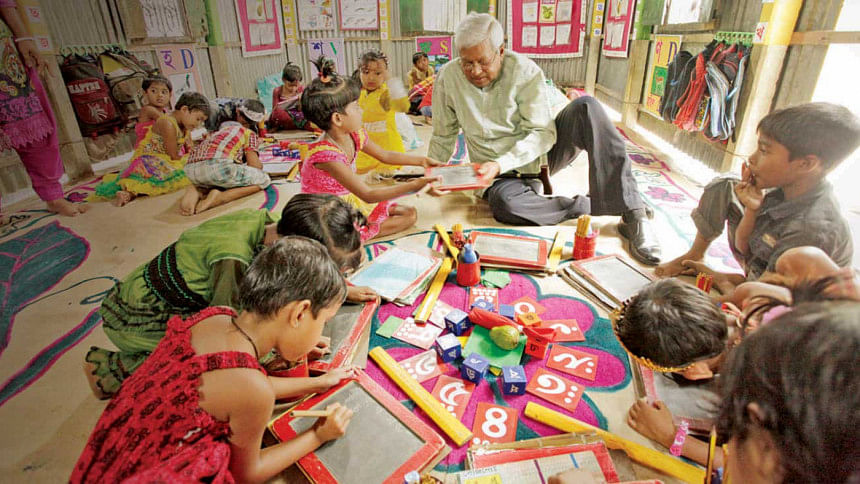
One of the few radical change makers that began a journey right after independence to transform the country for the better is BRAC. Established in 1972, the largest NGO in the world has dedicated itself to alleviating poverty, and helping the underprivileged to bring about positive changes in their lives by creating opportunities for them. "In the 43 years since BRAC's inception as a small relief organisation, the poor of Bangladesh have been examples, for the whole world, of strength and resilience. They are a shining example of what is possible when people struggling with poverty have the tools they need to take control of their lives," says Sir Fazle Hasan Abed, KCMG, the founder and chairperson of BRAC. Last year, Sir Fazle was ranked 32 in the list of The World's 50 Greatest Leaders by Fortune.
Celebrating 43 years this month, BRAC has successfully created landmarks in various areas in society. Ensuring social and financial empowerment of women, advocating community empowerment, delivering legal services to the doorstep of the poor, empowering farmers providing healthcare and education to millions and so much more. BRAC also runs the world's largest private, secular education system, with 44,909 schools worldwide. "I don't like to say what BRAC has done for Bangladesh. Instead, I point to what the poor have done for themselves and for this country – especially women. It is their hard work and resilience that has lifted us up since liberation,” he tells us.
"There is still much to be done," he adds. "As people who support the struggles of the poor, our job is to listen and learn from them, and to offer solidarity on this journey. BRAC is a learning organisation, and the journey from poverty is one we all must take together, men and women, rich and poor. I see a Bangladesh in which people strive with dignity to reach their fullest potential."
Health Nutrition and Population Programme
BRAC started its health interventions as a part of its integrated package of services as early as 1973, just one year after its initiation. The core of BRAC's approach to healthcare is its frontline community health workers (CHWs); these women hail from poor communities, providing and promoting vital healthcare goods and services to their neighbours' doorsteps. Trained by BRAC, these frontline healthcare workers are self-employed entrepreneurs who create an effective bridge between under-served communities and formal healthcare systems, providing essential low cost health services to over 120 million Bangladeshis.
BRAC's approach to health combines preventive, promotive, curative and rehabilitative health services to reach poor, disadvantaged, socially excluded and hard to reach populations. They believe that to promote sustainable development in health, empowering communities, developing skills of health human resources, ensuring health services, and creating supporting environments are essential.
Community Empowerment Programme
Established in 1977, the Community Empowerment Programme is primarily providing behaviour change communication, to improve the situation of women in the rural space. CEP focuses on empowering the rural poor, especially women, to build, secure and use their human, social and political capital. The programme also strengthens local governance to make the leaders more accessible and responsive to the needs of the poor people in their communities. This initiative develops the capacity of union parishad representatives and addresses gender inequality within the union parishad structure.
Through staged plays and community radio station, the programme gives people access to information which is critical for socioeconomic development. The Radio Pollikontho (99.2 FM) similarly delivers a wider range of information about empowerment of the rural communities.
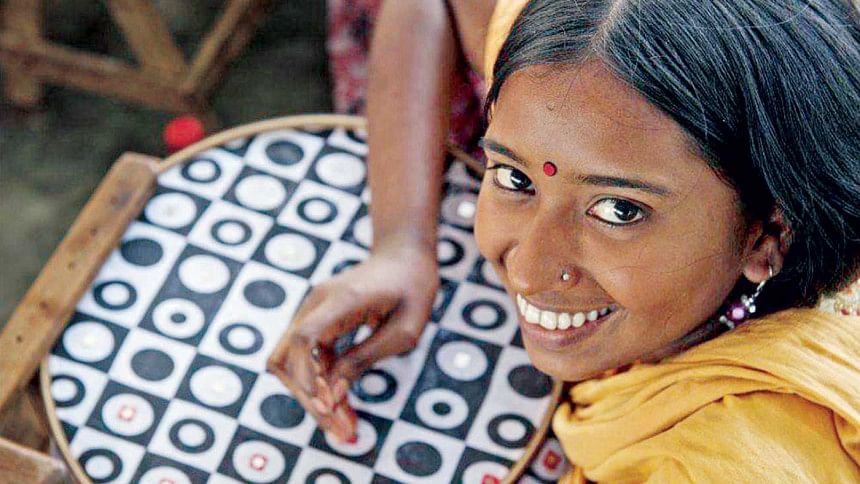
Ultra Poor Programme
Initiated in 2002, BRAC's ultra poor programme aims to fulfill the first MDG by eradicating extreme poverty and hunger, with the specific target to halve the proportion of people who live on $1.25 dollar a day. This programme is now being adapted in different countries around the world, namely Afganisthan and Pakistan.
Realising the compelling need for addressing extreme poverty in the urban slums, in 2010 the programme expanded to Dhaka, Khulna and Chittagong. Since its inception, the programme covered 1.6 million ultra poor households in 44 districts.
BRAC International
Reaching out in 11 countries, BRAC started its first international operation in Afghanistan in 2002 and continues to play a significant role in the country's development. Currently, they serve in 15 provinces and hard-to-reach communities, reaching 3.28 million people through education, healthcare, national solidarity programmes and capacity development programmes.
In Uganda in 2006, BRAC has become one of the largest development organisations in the country. It reaches close to four million people, with programmes in microfinance, small enterprises development, agriculture, poultry and livestock, empowerment and livelihood for adolescents and scholarship programmes.
BRAC began work in Tanzania in 2006 by adapting and implementing comprehensive development models. It reaches approximately 2.64million people with programmes in microfinance, small enterprise development, agriculture, poultry and livestock and empowerment and livelihood for adolescents.
Operating since 2006, BRAC's commitment in South Sudan remains strong in education, youth empowerment, peace building, healthcare and nutrition, agriculture and food security, and the ultra poor programme. They serve over 1.3 million people in the country.
Human Rights and Legal Empowerment Programme
Established in 1986, Human rights and legal aid services programme empowers the marginalised people by informing them of their legal and human rights.
Through BRAC-trained barefoot lawyers, legal education is provided to inform people, particularly women, about their basic legal and human rights so that they can defend themselves and resist discrimination and exploitation within their communities. The barefoot lawyers are the key access points within communities who make legal representation and awareness raising sustainable. The odhikarshebis, or legal aid volunteers, are trained to help clarify the legal process and make it easier for the disadvantaged people to achieve justice in the wake of human rights infringements.
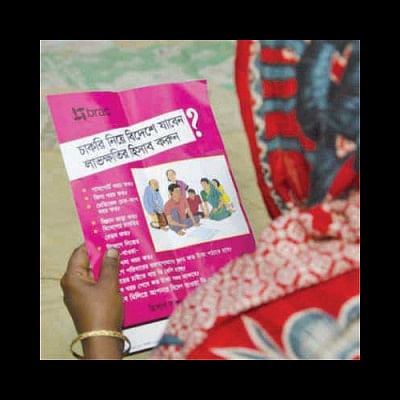
BRAC Migration Programme
BRAC's migration programme is working to ensure the rights of migrants by providing an easy access to services that help them avoid exploitation as Bangladeshi migrants. The programme started in 2006 covering 17 upazilas with a pilot of safe migration advocacy and a service facilitation programme. Now it has expanded its operation in 124 upazilas.
Some of the underlying causes of migrant exploitation are limited access to information, inadequate services from government and non-government agencies at all levels, and lack of proactive policymaking and implementation. Through the safe migration facilitation centres, BRAC is building a strong grass-root force. Community volunteers, Uthan Baithak, popular theatre shows, skill building workshops, language training and discussions at the policy making level are some of the key components. BRAC also helps returnee migrants with remittance management.
Gender Justice and Diversity Programme
The gender justice and diversity (GJD) programme works simultaneously within the organisation and with the community striving for equality, diversity and inclusiveness within BRAC as well as improving gender relations. At the national level, the programme promotes gender equality and addresses gender-based violence by influencing government policies and agendas, organising public forums and events, and leveraging national and international alliances for gender justice.
GJD works in multiple BRAC schools to raise awareness among the students, teachers, and parents against sexual harassment in public places. The MEJNIN (or, safe citizenship for girls) project sensitises youth against sexual harassment incidences, builds their confidence and motivates them to act as change makers.
Currently, BRAC has a human resource policy and procedures, a sexual harassment elimination policy, an active sexual harassment redressal committee, and an open discussion forum (monkhulakatha bola) for staff to foster gender sensitivity within the organisation. The GJD programme also provides support to employees with a day care centre, and builds the capacity of employees to independently tackle gender-based discrimination in the institution and correct gender blindness in their programme design.
Expanding its focus on the urban space, GJD in partnership with maya.com.bd has launched the first ever one-touch help service app for women of Bangladesh. 'Maya Apa' is an android-based mobile application, providing women and girls a space to ask pertinent medical, social and legal questions anonymously, and receive answers from a team of specialists.
Other Endeavours
BRAC's agriculture programmes work with governments to ensure food security by disseminating technology for hybrid crops amongst the farmers.
BRAC Disaster, Environment and Climate Change (DECC) works with the community to build resilience, foster adaptation and respond holistically to the effects of climate change and natural disasters.
BRAC introduced its Road Safety Programme in March, 2001, which mobilises community living along highways, raising awareness regarding road safety and facilitating them to plan, undertake and sustain their local road safety initiatives.
BRAC's water, sanitation and hygiene (WASH) programme works to provide integrated water and sanitation services and promotes hygiene in hard‐to‐reach areas and to underserved populations of the country.
Established in 1975, BRAC's Research and Evaluation Division (RED), plays an integral role in designing BRAC's development interventions, monitoring progress, documenting achievements, and undertaking impact assessment studies.
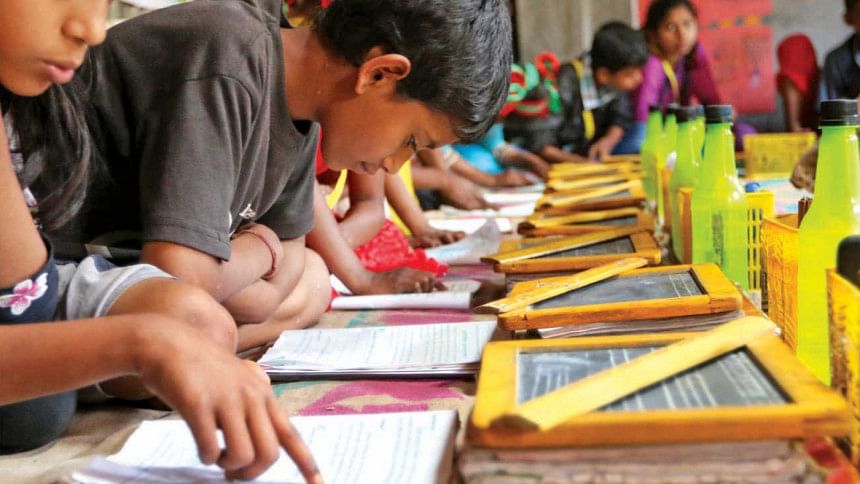
BRAC Education Programme
With education programmes in six countries, BRAC has built the largest secular, private education system in the world, with over 700,000 students worldwide including around 10 million students in Bangladesh enrolled in BRAC primary schools since 1985. Designed to give a second chance at learning to the disadvantaged students, the schools complement mainstream school systems with innovative teaching methods and materials.
Even in areas that are seasonally submerged under water, BRAC has made primary school education available to children by introducing boat schools. Scholarship programmes are also available that provide financial support to talented students by paying for their college or university tuition fees, at home and abroad.
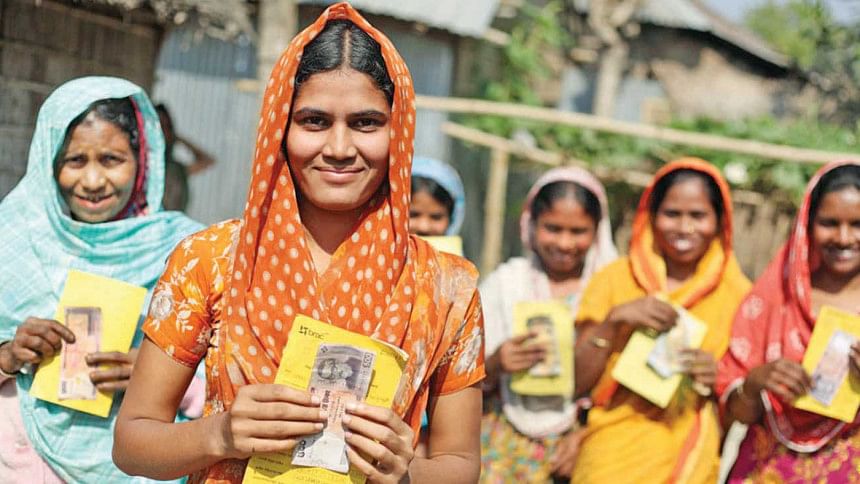
BRAC Microfinance Programme
Since launching their microfinance activities in 1974, BRAC has grown to become one of the world's largest providers of financial services for the poor. Innovative, inclusive, and client-focused, BRAC has utilised its 40 years of expertise to design, test, and adapt loan and savings products to meet the unique needs of people living in poverty.
BRAC currently operates microfinance programmes in seven countries including Bangladesh, Pakistan, Sierra Leone, Uganda, Liberia, Tanzania and Myanmar. With BRAC, clients are able to access savings products and loans from between USD 100 – 10,000.

 For all latest news, follow The Daily Star's Google News channel.
For all latest news, follow The Daily Star's Google News channel. 


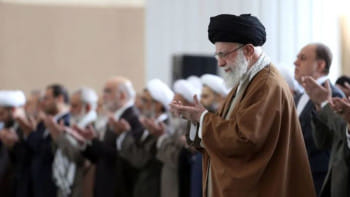
Comments